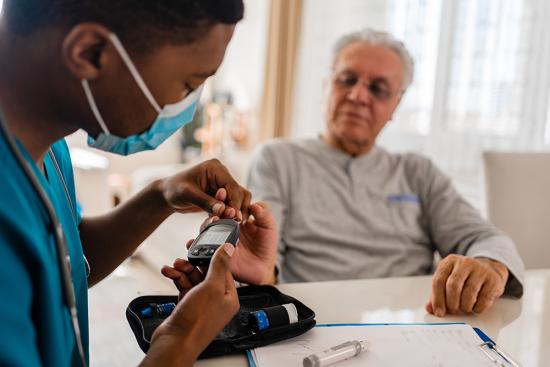
Have you noticed any changes in your Hemoglobin A1C (HbA1c) over the years? HbA1c is a simple blood test that measures your average blood sugar levels over the past 3 months. It's one of the commonly used tests to diagnose prediabetes and diabetes and is also the main test to help you and your health care team manage your diabetes.
A higher HbA1c value indicates that a person's blood sugar levels have been consistently elevated over time, which can be an indicator of poor diabetes management and potential health risks. Conversely, a lower HbA1c value indicates better blood sugar control. Below are a few lifestyle factors to also consider that can influence your HbA1c.
Sleep Disorders
Both short and long sleep durations are associated with an increased HbA1c. Also, poor sleep quality is associated with a higher HbA1c. Getting too little or too much sleep is linked with higher HbA1c. A person diagnosed with diabetes that has sleep apnea often tends to have higher levels.
Meal Routine
Consistently skipping meals or having an irregular eating schedule could result in blood glucose fluctuations. Over time, inconsistent consumption of energy and food can impact your HbA1c average to be high.
Hormone Changes
Several hormonal changes can affect your A1C level. Menstruation and menopause create hormonal changes in your body, which can then affect blood sugar levels for women. Physical or emotional stress can also play a role in your A1C level. Stress triggers the release of hormones that can raise your blood sugar level, which can cause your A1C to increase as well.
Iron Deficiency
Lacking iron in your diet can lead to iron deficiency anemia, a condition characterized by symptoms like weakness, fatigue, paler skin than usual, and shortness of breath. Iron deficiency is associated with increased A1C levels in people with diabetes. Experts estimate that around 10 percent to 30 percent of individuals with diabetes have anemia, and approximately one-third of those people with anemia are deficient in iron.
Exercise
There are a few ways that exercise lowers blood glucose. Insulin sensitivity is increased, so your muscle cells are better able to use any available insulin to take up glucose during and after activity. When your muscles contract during activity, your cells are able to take up glucose and use it for energy whether insulin is available or not. This is how exercise can help lower blood glucose in the short term. And when you are active on a regular basis, it can also lower your A1C.
Certain Medication
Many medications can affect A1C levels by altering insulin secretion, reducing insulin sensitivity, or increasing sugar production.
Some medications that may increase blood sugar levels include:
- opioids
- aspirin
- steroids
- antidepressants
- anti-anxiety medications
- cholesterol-lowering drugs
- antiseizure medications
- blood pressure medications
If you take any of the medications listed above, talk with a doctor about the potential effects on blood-sugar levels.
Understanding the relationship between blood glucose and HbA1c can enable you to take proactive steps in managing your health. Always consult a healthcare professional for personalized guidance and medical advice. Click here to schedule a free biometric screening on campus.
If you have more questions or would like to work with a health coach on behavioral changes, Click here to make an appointment. Health Coach Jessica is a certified diabetes and education specialist who can work one-on-one with you.
